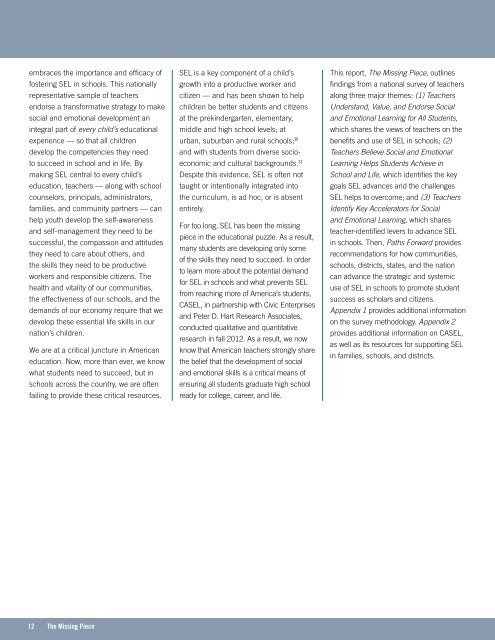CASEL-Report-low-res-FINAL
CASEL-Report-low-res-FINAL
CASEL-Report-low-res-FINAL
You also want an ePaper? Increase the reach of your titles
YUMPU automatically turns print PDFs into web optimized ePapers that Google loves.
embraces the importance and efficacy of<br />
fostering SEL in schools. This nationally<br />
rep<strong>res</strong>entative sample of teachers<br />
endorse a transformative strategy to make<br />
social and emotional development an<br />
integral part of every child’s educational<br />
experience — so that all children<br />
develop the competencies they need<br />
to succeed in school and in life. By<br />
making SEL central to every child’s<br />
education, teachers — along with school<br />
counselors, principals, administrators,<br />
families, and community partners — can<br />
help youth develop the self-awareness<br />
and self-management they need to be<br />
successful, the compassion and attitudes<br />
they need to care about others, and<br />
the skills they need to be productive<br />
workers and <strong>res</strong>ponsible citizens. The<br />
health and vitality of our communities,<br />
the effectiveness of our schools, and the<br />
demands of our economy require that we<br />
develop these essential life skills in our<br />
nation’s children.<br />
We are at a critical juncture in American<br />
education. Now, more than ever, we know<br />
what students need to succeed, but in<br />
schools across the country, we are often<br />
failing to provide these critical <strong>res</strong>ources.<br />
12 the Missing Piece<br />
SEL is a key component of a child’s<br />
growth into a productive worker and<br />
citizen — and has been shown to help<br />
children be better students and citizens<br />
at the prekindergarten, elementary,<br />
middle and high school levels; at<br />
urban, suburban and rural schools; 30<br />
and with students from diverse socioeconomic<br />
and cultural backgrounds. 31<br />
Despite this evidence, SEL is often not<br />
taught or intentionally integrated into<br />
the curriculum, is ad hoc, or is absent<br />
entirely.<br />
For too long, SEL has been the missing<br />
piece in the educational puzzle. As a <strong>res</strong>ult,<br />
many students are developing only some<br />
of the skills they need to succeed. In order<br />
to learn more about the potential demand<br />
for SEL in schools and what prevents SEL<br />
from reaching more of America’s students,<br />
<strong>CASEL</strong>, in partnership with Civic Enterprises<br />
and Peter D. Hart Research Associates,<br />
conducted qualitative and quantitative<br />
<strong>res</strong>earch in fall 2012. As a <strong>res</strong>ult, we now<br />
know that American teachers strongly share<br />
the belief that the development of social<br />
and emotional skills is a critical means of<br />
ensuring all students graduate high school<br />
ready for college, career, and life.<br />
This report, The Missing Piece, outlines<br />
findings from a national survey of teachers<br />
along three major themes: (1) Teachers<br />
Understand, Value, and Endorse Social<br />
and Emotional Learning for All Students,<br />
which sha<strong>res</strong> the views of teachers on the<br />
benefits and use of SEL in schools; (2)<br />
Teachers Believe Social and Emotional<br />
Learning Helps Students Achieve in<br />
School and Life, which identifies the key<br />
goals SEL advances and the challenges<br />
SEL helps to overcome; and (3) Teachers<br />
Identify Key Accelerators for Social<br />
and Emotional Learning, which sha<strong>res</strong><br />
teacher-identified levers to advance SEL<br />
in schools. Then, Paths Forward provides<br />
recommendations for how communities,<br />
schools, districts, states, and the nation<br />
can advance the strategic and systemic<br />
use of SEL in schools to promote student<br />
success as scholars and citizens.<br />
Appendix 1 provides additional information<br />
on the survey methodology. Appendix 2<br />
provides additional information on <strong>CASEL</strong>,<br />
as well as its <strong>res</strong>ources for supporting SEL<br />
in families, schools, and districts.


